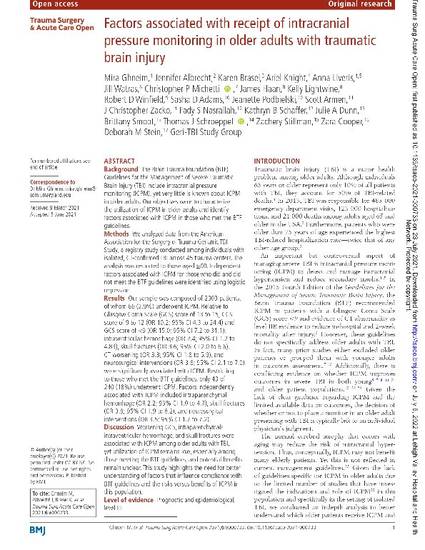
BACKGROUND: The Brain Trauma Foundation (BTF) Guidelines for the Management of Severe Traumatic Brain Injury (TBI) include intracranial pressure monitoring (ICPM), yet very little is known about ICPM in older adults. Our objectives were to characterize the utilization of ICPM in older adults and identify factors associated with ICPM in those who met the BTF guidelines.
METHODS: We analyzed data from the American Association for the Surgery of Trauma Geriatric TBI Study, a registry study conducted among individuals with isolated, CT-confirmed TBI across 45 trauma centers. The analysis was restricted to those aged ≥60. Independent factors associated with ICPM for those who did and did not meet the BTF guidelines were identified using logistic regression.
RESULTS: Our sample was composed of 2303 patients, of whom 66 (2.9%) underwent ICPM. Relative to Glasgow Coma Scale (GCS) score of 13 to 15, GCS score of 9 to 12 (OR 10.2; 95% CI 4.3 to 24.4) and GCS score of(OR 15.0; 95% CI 7.2 to 31.1), intraventricular hemorrhage (OR 2.4; 95% CI 1.2 to 4.83), skull fractures (OR 3.6; 95% CI 2.0 to 6.6), CT worsening (OR 3.3; 95% CI 1.8 to 5.9), and neurosurgical interventions (OR 3.8; 95% CI 2.1 to 7.0) were significantly associated with ICPM. Restricting to those who met the BTF guidelines, only 43 of 240 (18%) underwent ICPM. Factors independently associated with ICPM included intraparenchymal hemorrhage (OR 2.2; 95% CI 1.0 to 4.7), skull fractures (OR 3.9; 95% CI 1.9 to 8.2), and neurosurgical interventions (OR 3.5; 95% CI 1.7 to 7.2).
DISCUSSION: Worsening GCS, intraparenchymal/intraventricular hemorrhage, and skull fractures were associated with ICPM among older adults with TBI, yet utilization of ICPM remains low, especially among those meeting the BTF guidelines, and potential benefits remain unclear. This study highlights the need for better understanding of factors that influence compliance with BTF guidelines and the risks versus benefits of ICPM in this population.
LEVEL OF EVIDENCE: Prognostic and epidemiological, level III.
Ghneim M, Albrecht J, Brasel K, Knight A, Liveris A, Watras J, Michetti CP, Haan J, Lightwine K, Winfield RD, Adams SD, Podbielski J, Armen S, Zacko JC, Nasrallah FS, Schaffer KB, Dunn JA, Smoot B, Schroeppel TJ, Stillman Z, Cooper Z, Stein DM; Geri-TBI Study. Factors associated with receipt of intracranial pressure monitoring in older adults with traumatic brain injury. Trauma Surg Acute Care Open. 2021 Jul 23;6(1):e000733. doi: 10.1136/tsaco-2021-000733.
